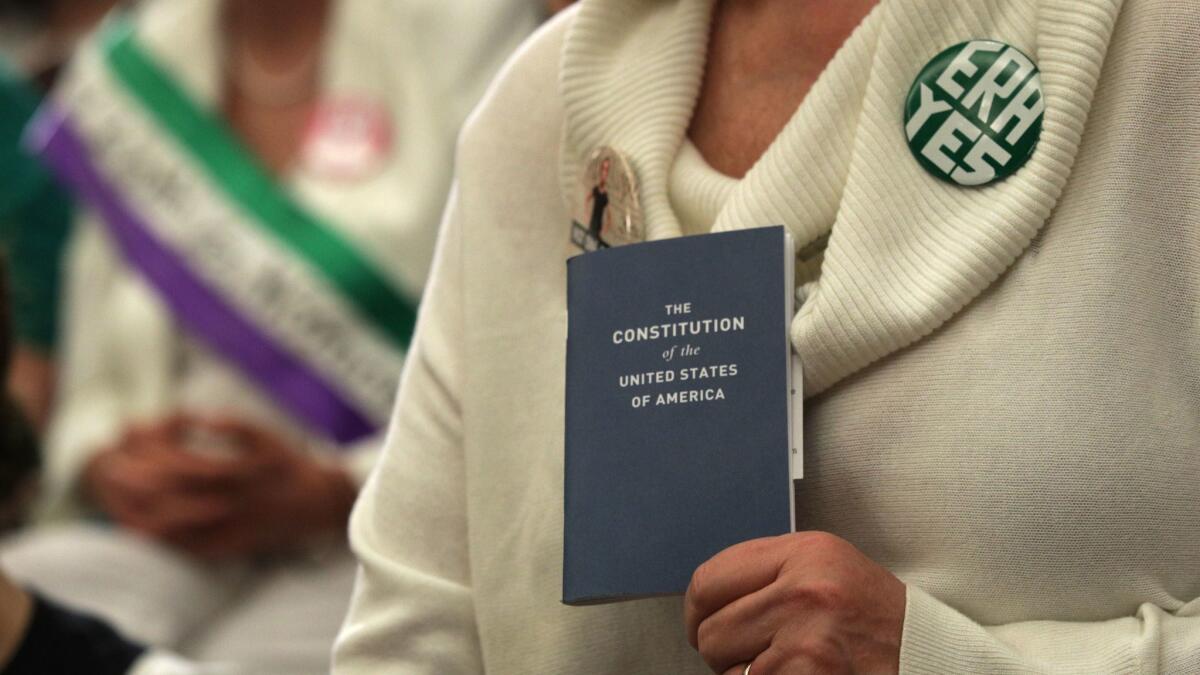After nearly 50 years, the Equal Rights Amendment finally has a chance. Thanks, Virginia

- Share via
The blue wave that flipped the Virginia Legislature last week was a victory for Democrats in the commonwealth, who will now be in control for the first time in more than 20 years.
But this milestone could affect more than just Virginia. It’s a potentially historic turning point for women and their equal rights. Because now that Democrats are in charge of both houses of the Virginia General Assembly, the Equal Rights Amendment might finally be approved there, which would mean it has been approved by three-fourths of the states — the threshold set for changing the U.S. Constitution.
The decades-long effort to amend the Constitution to explicitly outlaw sex discrimination seemed hopelessly stalled until 2017, when the Nevada Legislature unexpectedly voted to ratify — 45 years after Congress sent the amendment to the states for approval. Then, in 2018, the Illinois Legislature did the same, and suddenly it seemed that the ERA might actually reach the constitutional threshold. But efforts to get a 38th state to approve the amendment this year failed. A ratification bill in Virginia’s House of Delegates by Democrat Jennifer Carroll Foy was squashed by her Republican colleagues, who wouldn’t even let the proposal get out of a subcommittee.
Crazy as it seems, Republicans continue to oppose an amendment guaranteeing equal rights for women even in the 21st century. But their argument has shifted from decrying its threat to traditional gender roles to claiming that the ERA is unnecessary because of past Supreme Court rulings on discrimination. Even if passing the ERA were only a symbolic act, and we think it would be much more than that, then what’s the harm in enshrining it in the country’s most enduring statement of values?
Virginia’s Democratic lawmakers should make ratification a priority as soon as the Legislature convenes in 2020. Even so, that won’t be the end of the fight. The final brawl will take place in Congress and possibly the Supreme Court over whether the deadline Congress set for ratifying the ERA can be changed retroactively and whether states can rescind their earlier votes to ratify.
When Congress voted to propose the ERA in 1972, it gave the states seven years to approve it, though the Constitution imposes no such requirement. The deadline was later extended by three years, but it still wasn’t enough time; only 35 state legislatures ratified the ERA by 1982. Worse, five of them apparently had second thoughts and subsequently voted to rescind their ratification, though some legal scholars believe that’s not allowed. As for the deadline, House Democrats are trying to get around that by retroactively removing it.
Ultimately, it will probably fall to a court to decide whether the ERA can be legally revived, but that’s unlikely to happen until a 38th state ratifies and forces the issue. Are you ready, Virginia?
More to Read
A cure for the common opinion
Get thought-provoking perspectives with our weekly newsletter.
You may occasionally receive promotional content from the Los Angeles Times.









